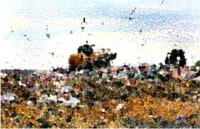
WHATEVER HAPPENED TO RECYCLING?

Sorted rubbish turns out to be a real waste
- Dateline
- 12 June 2012
In nature, the word ‘detritus’ describes the dead discarded organic material within an ecosystem. Examples include leaf litter on the floor of the forest or the marine fragments at the base of coral reefs. Also in nature, microorganisms colonize detritus helping to decompose it.
In our 21st Century world, the primary detritus is the mountains of waste we create. There was a time when we could just dump it, finding ever-new unused places that we could pollute. Then recycling kicked in. We collected glass, paper, tin and plastic waste separately and re-used them to reduce trash.
The waste industry turned out to be our ‘microorganisms’, and a profitable system it was too. Companies such Veolia profited from a growing markets in waste and sanitation. In Beijing alone more than 160,000 waste collectors plied their trade.
By 2008, the business model started falling apart. Reports came in that waste collectors were able to obtain less than US10c for a kilogram of plastic.
The financial implosion made matters much worse in the primary markets for waste products – Asia.
China was Europe’s biggest buyer of waste – more than 50% of exports. Demand for their products in world markets and the associated packaging was shrinking- and markets for waste products simply plummeted.
In the rest of the world, mountains of used glass, paper, tin and plastic were building as there were no buyers for the recyclable material, at any price.
Almost 90% of the world’s recycling units have closed and millions are unemployed as a result. “The demand for plastic granules is at an all-time low,” said one former operator in Hongkai.
In 2008, US waste exports to China exceeded $11 billion. This year the number is close to zero.
Under tight financial pressures, local governments have had to stop collecting recyclable materials separately and are back to dumping everything into giant landfills. ‘Green’ processes established over the past decades have suddenly ceased.
Some consumers are delighted that their lives are simpler today, but the war for the future of the environment will have to be fought all over again, once economic growth kicks in.
We have, in effect, killed off the economic microorganisms that fed on our waste.
Warning: Hazardous thinking at work
Despite appearances to the contrary, Futureworld cannot and does not predict the future. Our Mindbullets scenarios are fictitious and designed purely to explore possible futures, challenge and stimulate strategic thinking. Use these at your own risk. Any reference to actual people, entities or events is entirely allegorical. Copyright Futureworld International Limited. Reproduction or distribution permitted only with recognition of Copyright and the inclusion of this disclaimer.